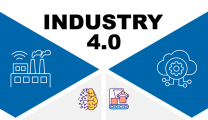What is change management in production and why is it important?
Change management is the process of planning, implementing, and controlling changes in an organization's processes, systems, or structures. In the manufacturing industry, change management is critical to improving productivity, efficiency, and profitability. It involves identifying opportunities for improvement, developing change strategies, and managing the transition to new processes or systems.

Change management in manufacturing is very important for businesses
Change management is important to manufacturing businesses because it allows them to quickly adjust to changes in market trends, technological advancements, and consumer preferences, helping them to stay relevant. compete. By smoothly implementing new systems or processes, it reduces disruption and risk. Furthermore, it encourages a culture of continuous improvement and fosters employee engagement by engaging them in the change process, fostering a sense of pride and responsibility in their roles.
What are the common challenges faced when managing change in production?
While it's important to drive continuous improvement and stay competitive, managing change often comes with a number of challenges. Some of the most common challenges encountered in change management in manufacturing include:
1, Resisting change: One of the most important challenges in change management is overcoming employee resistance. , who may be reluctant to adopt new processes or technologies. Employees may resist change due to fear of job loss, increased workload, or uncertainty about their ability to adapt. Overcoming resistance requires effective communication, employee involvement in the change process, and providing needed support and training.
2. Lack of clear vision and goals:Change initiatives can fail if they are not guided by a clear vision and specific, achievable goals. Without clear direction, employees may have difficulty understanding the purpose of the change and how it will benefit the organization. Establishing a clear vision and setting realistic goals are essential for successful change management.
3. Inadequate communication: Poor communication can lead to confusion, misunderstanding and miscommunication about change initiatives. It is important to develop a comprehensive communication plan to ensure all employees are informed about the changes, the reasons behind them, and how they will be affected. Regular updates and opportunities for feedback can help create a sense of transparency and trust.
4. Insufficient resources and support: Making a change in production requires adequate resources, including time, budget, and personnel. Organizations can face challenges in allocating enough resources to support a change initiative, leading to delays, suboptimal results, or even failure. Ensuring adequate resources and employees have access to the necessary training and support is critical to successful change management.
5. Poor project management: Change initiatives often involve multiple tasks, dependencies and deadlines. Inadequate project management can lead to delays, cost overruns and ultimately failure to achieve the desired results. Implementing a structured project management approach, with clearly defined roles, responsibilities, and milestones, can help keep a change initiative on track.
6. Inability to measure and monitor progress:Measuring and monitoring the progress of change initiatives is essential to determining their success and identifying areas for improvement. However, organizations can find it difficult to develop appropriate measurement and tracking systems, making it difficult to assess the effectiveness of their change efforts. Establishing clear performance indicators and regularly monitoring progress can help ensure that change initiatives stay on track and deliver the desired results.
What techniques and strategies can be used to ensure change management in production?
Change is integral to the growth and development of any productive organization. However, change management can be a complex process that requires careful planning and execution. Here are some techniques and strategies that manufacturers can use to ensure successful change management:
1. Create a clear and compelling vision: A clear and compelling vision is the cornerstone of successful change management. Producers should define the desired outcome of a change initiative and communicate it effectively to all stakeholders.

Clear and compelling vision is the foundation of change management in production
2. Involve employees at all levels: Change management should never be a top-down approach. Manufacturers should involve employees at all levels in the change process to gain their support and commitment.
3. Effective communication: Effective communication is critical to successful change management. Producers should use multiple channels to communicate change initiatives, including town hall meetings, email, newsletters, and social media.
4. Develop a blueprint: A blueprint is essential to guide the change process. Manufacturers should define the scope, timing, and milestones of their change initiative and monitor progress regularly.
5. Cost-benefit assessment: Change can come at a cost, such as investment in new technology, training, or restructuring. Manufacturers need to assess the cost benefit of the change and determine if the benefits outweigh the costs. This can help ensure that the change is financially viable and sustainable for the organization in the long run.
6. Market monitoring: Change can also be driven by external factors, such as changes in market demand, emerging technology or regulatory requirements. Manufacturers should monitor the market and stay informed of any changes that may affect their organization. By staying up to date with market trends, manufacturers can anticipate future changes and proactively prepare their organizations for those changes.
7. Provide training and support: Change can be anxiety-provoking for employees, and they may need training and support to adapt to new processes and systems. Manufacturers should provide adequate training and support to ensure a smooth transition.
8. Celebrate successes: Celebrating successes is crucial to staying motivated and driving engagement. Manufacturers should recognize and reward employees who contribute to the success of the change initiative.
Change management in manufacturing involves identifying improvement opportunities, developing change strategies, and managing transitions to new processes or systems. This is a complex process that requires a strategic and holistic approach to ensure successful implementation and sustainable results.












Replies to This Discussion